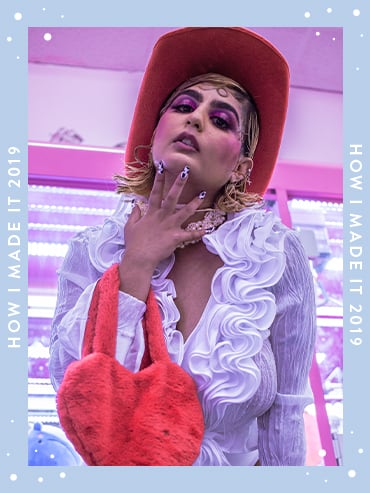Getting Deported Prompted This DJ to Shift Her Career Goals
Chhavi Nanda on how she made it happen


Name: Chhavi Nanda, a.k.a. Chippy Nonstop
Job title: DJ and curator of safe spaces and events
Age: 28
From: California
Currently lives in: Toronto
Education: High school diploma
First job out of school: Freelance music journalist
“It just kinda happened,” says Chhavi Nanda, better known as songwriter and DJ Chippy Nonstop, when asked about how she got into the music industry. Her mother was a dance teacher, so growing up in California she was always surrounded by music. By the time she was in high school and got her own computer, she started making and putting out her own mixes. It wasn’t long before rappers in California’s Bay Area, including a then up-and-coming G Eazy, started taking notice and asking her to collaborate.
That backstory might make it seem like Chippy Nonstop, who earned her DJ name because she eats chips nonstop (relatable), stumbled into the music industry, but it was her passion from early on. “I feel like the only people who thought it was a hobby were my family, but I always knew that it was going to be my job,” she says.
But things took a hard turn for Chippy Nonstop after she was (very publicly) deported from the U.S. and forced to relocate to Canada. Removed from the American music scene, Nanda had to rethink her career, which at the time was largely songwriting and rapping. “I started focusing more on DJing and community, and that really helped me figure out who I am in music and in the world,” she says. Chippy Nonstop paired up with DJ Rhi Blossom to create “Intersessions,” a workshop and seminar series “to address the significant gender- and sexuality-based imbalance within the music industry.” Put plainly, she wanted to help women, especially women of colour and the LGBTQ community, in the way that she wished someone had helped her when she was breaking into the industry.
“I was getting taken advantage of because I didn’t know my worth in the industry, because everyone around me was a white dude,” recalls Nanda. She explains, for instance, that when she started out, she had no idea what contracts to have or how much to charge. She notes that a lot of the people opening up the music industry are women, and even though things are changing, there are still a lot of barriers keeping women and queer people from booking major venues or festivals, such as a serious lack of agents and the misperception that women aren’t able to sell tickets. “We have to create our own spaces,” she says. “We’re not getting handed things—we have to do it ourselves.”
FLARE Archived Content
To see the original article, search for it on the Flare archive: https://flare.fashionmagazine.com








